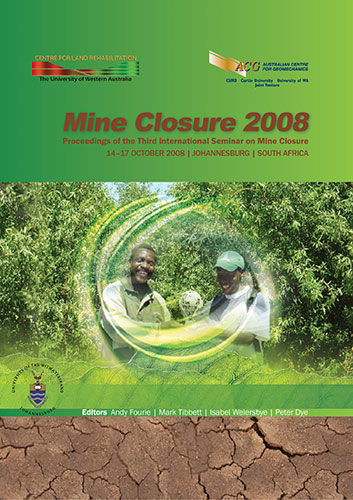Mine Closure to Relinquishment — The Development of Partnerships and Management Tools to Support the Process

|
Authors: McIlveen, G; Mulligan, DR; Baumgartl, T; Edraki, M; Pudmenzky, A; Rossato, L |
DOI https://doi.org/10.36487/ACG_repo/852_19
Cite As:
McIlveen, G, Mulligan, DR, Baumgartl, T, Edraki, M, Pudmenzky, A & Rossato, L 2008, 'Mine Closure to Relinquishment — The Development of Partnerships and Management Tools to Support the Process', in AB Fourie, M Tibbett, I Weiersbye & P Dye (eds), Mine Closure 2008: Proceedings of the Third International Seminar on Mine Closure, Australian Centre for Geomechanics, Perth, pp. 207-214, https://doi.org/10.36487/ACG_repo/852_19
Abstract:
As a mine is closed, the management process is highly likely to be required to support on-going site management and reporting to stakeholders and regulators, for decades afterwards. It is essential, therefore, to ensure the maintenance of corporate memory by retaining essential site data. This site data will provide the foundation for the research science that may be needed to provide confidence on residual risk to regulators in order to gain relinquishment. Partnerships between tertiary institutions and corporations holding the mine sites provide one mechanism to achieve long-term stewardship of site information essential to meet regulatory requirements and support research to fill gaps in knowledge of site-specific natural systems and rehabilitation performance. A set of management system tools has been developed to manage and utilize the wide range of data, reports and images remaining at a number of closed mines, in partnership with the organizations ultimately responsible for the closed sites. This includes purpose-built software that combines accurate and to-scale three-dimensional photo images and scientific software to hold, display and interpret the wide range of environmental data at each site.
References:
Australian and New Zealand Minerals and Energy Council and Minerals Council of Australia (2000) Strategic
framework for mine closure, 22 p.
Edraki, M., Baumgartl, T. and Haymont, R. (2006) Investigating the linkage between water fluxes, geochemistry and
water quality in the post-closure landscape of the Mount Leyshon Mine, Queensland. 1st International Seminar
on Mine Closure, Perth, Australia. Australian Centre for Geomechanics, Perth, Australia, pp. 647-656.
Edraki, M., Baumgartl, T. and Noller, B.N. (2007) Developing a quantitative framework to assess the success of mine
site rehabilitation. Mine Closure 2007. Proceedings 2nd International Seminar on Mine Closure, Chile.
Australian Centre for Geomechanics, Perth, Australia, pp. 821-828.
Khanna, T. (ed) (2000) Mine closure and sustainable development – results of the workshop organized by The World
Bank Group Mining Department and Metal Mining Agency of Japan. Mining Journal Books Ltd, London, 154 p.
Mine Closure to Relinquishment — The Development of Partnerships and Management G. McIlveen et al.
Tools to Support the Process
Peck, P. (2005) Mining for closure, Policies and guidelines for sustainable mining practice and closure of mines. United
Nations Environment Programme (UNEP), United Nations Development Programme (UNDP), Organization for
Security and Cooperation in Europe (OSCE), and North Atlantic Treaty Organization (NATO).
Pudmenzky, A., Rossato, L., McIlveen, G. and Mulligan, D.R. (2006) Phoenix: A mine rehabilitation data visualisation
and management system. 1st International Seminar on Mine Closure, Perth, Australia. Australian Centre for
Geomechanics, Perth, Australia, pp. 773-779.
Tremblay, G. and Hogan, C. (2007) Experience of Canadian partnership programs. In A.B. Fourie, M. Tibbett and J.
Wiertz (eds) Mine Closure 2007. Proceedings 2nd International Seminar on Mine Closure, Chile. Australian
Centre for Geomechanics, Perth, Australia, pp. 43-52.
© Copyright 2026, Australian Centre for Geomechanics (ACG), The University of Western Australia. All rights reserved.
View copyright/legal information
Please direct any queries or error reports to repository-acg@uwa.edu.au
View copyright/legal information
Please direct any queries or error reports to repository-acg@uwa.edu.au